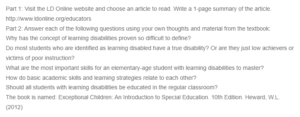Exceptional Children – Students with Learning Disabilities
Part 1: An Article from the LD Online Website
Article Summary
The article “Helping Students Understand and Accept their Learning Disabilities: The Demystification Conference” sheds light on how teachers could help learners with various disabilities cope with the challenges posed by these disabilities. Learners with special needs are usually abled differently, requiring teachers to collaborate with parents and families to pat on those talents (Elfrink and Mia 38). Studies have shown that successful teaching in institutions dealing with learners with special needs depends on teamwork. It is an essential tool to facilitate the easy transmission of knowledge. As such, support is one of the essential requirements to facilitate successful learning in teaching learning with exceptional learning needs. According to Elfrink and Mia, students with disabilities should be handled individually by tailoring plans that will help remove the mystery of their learning disabilities (40). The article advocates the importance of developing a demystification curriculum that empowers learners with disabilities to cope with their learning challenges.
The article advocates the need for teachers and parents to collaborate and hold conferences to encourage learners to deal with their challenges. Teachers should remember that when looking for ways to help these learners, they are also looking for ways to empower them to help themselves (Elfrink and Mia 70). The work of teachers and parents is not to offer a cure to these challenges but to help them with emotional tools so that special needs children can work through their challenges. This is because when these learners are more emotionally stable, they grow stronger and more resilient. As such, how teachers and parents behave and respond to possible challenges has a lasting impact on the child. Helping learners have a positive attitude toward learning will not only help them love what they do but also give the child hope and confidence to deal with challenges and eventually succeed in their education.
Part 2: Learning Disabilities
The concept of learning disabilities has proven challenging to define because different stakeholders follow varied criteria when defining this concept. It is an ambiguous field, and this leads to a lack of consensus on the definition. Different definitions have been formulated by demonstrating the primary characteristics of learning disabilities. However, to date, educators have Not Come To A Universally Agreed-Upon Definition Of Learning Disabilities.
Do Most Students Identified as Learning Disabled Have a True Disability? Or are They Just Low Achievers or Victims of Poor Instruction?
No. Most of the time, people confuse learning disabilities with learning difficulties that result in poor academic achievements. Learning disabilities are primarily a result of genetic issues or neurological factors that affect a child’s cognitive processes associated with learning. According to Heward, a learning-disabled child exhibits specific impairments that limit their ability to perform specific tasks (36). Students with learning disabilities are particularly those with visual, hearing, or motor handicaps and those with other intellectual disabilities.
Essential Skills for an Elementary-Age Student with Learning Disabilities to Master
For elementary school students with learning disabilities, important skills needed to help them succeed include self-awareness and self-confidence. Self-awareness and self-confidence will help these learners know their strengths in terms of abilities and hence will not question their effectiveness. These children also require life skills that help improve their sensory processing, communication, safety, and building social relationships because they will require independence in life (Heward 39).
Basic Academic Skills and Learning Strategies
Academic skills and learning strategies are connected because the selected academic skills to be taught determine the type of learning strategies to be used. For example, those in the English language, such as reading, writing, and speaking, are incorporated into the school curriculum, and their respective instructional methodologies are indicated. Teachers must develop instructional strategies to help transmit these skills to learners’ minds. Choosing the correct teaching strategy will help to successfully transmit these academic skills, hence helping in the retention of knowledge learned.
Should all Students with Learning Disabilities be Educated in their Regular Classrooms?
Yes. Students with learning disabilities should be educated in the regular classroom because they challenge teachers to select the best strategies that suit all learners’ needs. Inclusion is an essential aspect of any successful classroom. Heward advocates the importance of an inclusive classroom because when specific learners feel excluded from regular school programs, they are likely to feel isolated, anxious, doubtful, confused, and sad, which limits their ability to learn (39).
Works Cited
Elfrink, Mia Wernig. “Helping students understand and accept their learning disabilities: The demystification conference.” (2008). 1-79
Heward, William L., Exceptional children: An introduction to special education. Pearson Education/Merrill/Prentice Hall, 2006.
ORDER A PLAGIARISM-FREE PAPER HERE
We’ll write everything from scratch
Question

Exceptional Children
Part 1: Visit the LD Online website and choose an article to read. Write a 1-page summary of the article. http://www.ldonline.org/educators
Part 2: Answer each of the following questions using your own thoughts and material from the textbook:
Why has the concept of learning disabilities proven so difficult to define?
Do most students who are identified as learning disabled have a true disability? Or are they just low achievers or victims of poor instruction?
What are the most important skills for an elementary-age student with learning disabilities to master?
How do basic academic skills and learning strategies relate to each other?
Should all students with learning disabilities be educated in the regular classroom?
The book is named: Exceptional Children: An Introduction to Special Education. 10th Edition. Heward, W.L. (2012)


